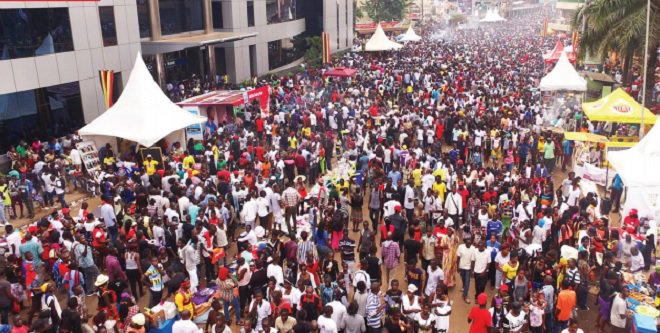
East Africa’s entertainment capital will be dull this October
Kampala, Uganda | RONALD MUSOKE | “Make a date with East Africa’s biggest street party during the festival weekend from Oct.5-7.” Well, not this year.
Kampala city, which carries the moniker of “East Africa’s entertainment capital,” will not be having savoury aromas of roast, drinking binges, and electric vibes by sensational artists entertaining thousands of people with painted faces and outlandish costumes on its streets this October.
As soon as the announcement was made on Sept.12, the tears started to flow; especially from the young population who are known for enjoying themselves at the slightest opportunity.
Youthful Michael Ssenabulya, from Kampala’s poor neighbourhood of Kamwokya has attended three of the past six city festivals. He is inconsolable about Kampala Capital City Authority’s cancelling of this year’s edition of the carnival.
“This event had become part of us. We have grown to anticipate and plan for this festival,” he said.
He says what he liked most about the carnival was the opportunity for him to mix with people from different parts of the city in one place, throughout the day, freely and without any fuss.
Sundays in Kampala are normally quiet and laid back but residents had come to associate the first week of October with probably the biggest street party in East Africa. Kampala Road, which is the city’s main street, would come alive during the carnival with music, dance, fashion and fanfare.
But Jennifer Musisi, the executive director of KCCA says this year, instead of parties and merrymaking, carnival sponsor contributions will go to KCCA projects; including re-roofing schools with residual asbestos roofs, improvement of city UPE schools and construction of a maternity ward at Kiswa Health Centre.
So what happened to the talk of the festival preserving Kampala’s history and tradition, stimulating the local economy, entertaining and involving the community and visitors in a fun-filled atmosphere? These are the objectives of the carnival that Musisi listed at its start six years ago in 2012.
Organizers had in fact modeled the Kampala festival on the famous Rio de Janeiro carnival in Brazil—an event which has been going on since the 1830s.
Musisi says KCCA has recently had an epiphany; that city residents could this year benefit from investments into facilities that serve them as a group.
“We realized it is the same people who come to the carnival that come to our health centres and send their children to our public schools.
“We had to do something for them. We love and enjoy festivities but we had to choose our priorities,” she said.
Carnival comes to Kampala
When it first featured on Kampala’s busy social scene in 2012, it was held as part of the celebrations to mark Uganda’s golden jubilee of independence.
The festival, however, made it back a year later and KCCA has since then been throwing one of the biggest street parties in East Africa attracting multitudes to Kampala residents every October to celebrate culture, unity and social life.
In fact, according to Musisi, the festival has been one of the fastest growing events in terms of numbers and activities.
On the weekend preceding Uganda’s independence anniversary celebrated on October 9, Kampala would become animated with glitzy sights, thrilling sounds and lively concerts complete with an array of floats winding through Kampala Road—the main route of the carnival. Some of Uganda’s popular musicians with their queen dancers would wiggle to some of the latest hits working up the youthful audiences.
Carnival goers would be treated to acrobatic shows, face-painting, a motor rally on the city streets, and manufacturers would showcase products, run promos and give gifts. Everything would be washed down with swigs of beer and soda after munching barbeque meat and chicken mchomos.
Even the Uganda Wildlife Authority has used the carnival to show wildlife to people who cannot afford to visit national wildlife parks.
 The Independent Uganda: You get the Truth we Pay the Price
The Independent Uganda: You get the Truth we Pay the Price





